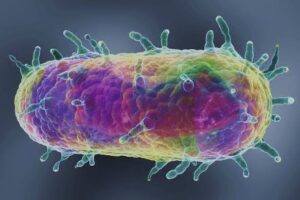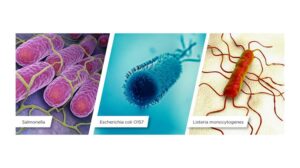Back to: MICROBIOLOGY 300 LEVEL
Welcome to class!
It’s a joy to have you here again! You’ve been doing well, and today’s lesson is another exciting one. We’ll be learning about three important bacteria—Yersinia pestis, Brucella, and Listeria monocytogenes—that cause serious diseases and have shaped history, even right here in Africa. These are not your everyday bacteria. They’re special because of how they spread, the kind of illnesses they cause, and the way they interact with both animals and humans.
Yersinia Pestis, Brucella, Listeria Monocytogenes
Yersinia pestis
This is the bacterium responsible for plague, including the famous Black Death that once wiped out millions in Europe. It is a Gram-negative bacillus and still exists today in some rural areas, including parts of Africa.

Transmission:
Carried by fleas that infest rodents like rats. Humans get infected through flea bites, contact with infected animals, or inhalation of infectious droplets.
Forms of Plague:
Bubonic plague: Causes swollen, painful lymph nodes (buboes), fever, and weakness.
Septicaemic plague: Bacteria enter the bloodstream—causing bleeding under the skin and organ failure.
Pneumonic plague: Affects the lungs and spreads through respiratory droplets—this is the most deadly form.
Prevention and Treatment:
Early treatment with antibiotics like streptomycin or doxycycline saves lives. Public health control includes rodent control and personal hygiene.
Imagine a remote village in Congo where people start falling ill after a rat infestation. Quick action by health officials and antibiotics help contain the outbreak.
Brucella
Brucella species are Gram-negative cocco-bacilli that cause brucellosis, a disease that spreads from animals to humans, especially through unpasteurised milk, raw meat, or close contact with infected livestock.
Symptoms:
Undulating fever (comes and goes)
Sweating, joint pain, muscle aches
Fatigue and weight loss
This is sometimes called “Malta fever” or “undulant fever.”
Transmission:
From animals like cattle, goats, or sheep. Farmers, butchers, and veterinarians are especially at risk.
Diagnosis and Treatment:
Blood cultures and serological tests confirm infection. Treated with a combination of antibiotics—typically doxycycline and rifampicin.
Think of a herdsman in Kaduna who often drinks fresh milk straight from the cow. He starts having fever and joint pain. A blood test confirms brucellosis, and with antibiotics, he recovers fully.
Listeria monocytogenes
This is a Gram-positive rod that causes listeriosis, a foodborne infection that affects the elderly, pregnant women, newborns, and people with weak immune systems.
Sources:
Found in contaminated food like unpasteurised milk, soft cheese, cold meats, and ready-to-eat packaged foods.
Symptoms:
Fever, muscle aches, nausea, and diarrhoea
In severe cases: meningitis, miscarriage, or stillbirth in pregnant women
Prevention and Treatment:
Practising good food hygiene, proper refrigeration, and avoiding high-risk foods in pregnancy. Treated with ampicillin, often combined with gentamicin.

Picture a pregnant woman in Abuja who eats soft cheese bought from a roadside vendor. She later becomes ill, and doctors diagnose listeriosis. Early treatment helps her and her baby survive.
Summary
- Yersinia pestis causes plague and is spread by fleas from rodents.
- Brucella causes brucellosis, often from raw milk or animal contact.
- Listeria monocytogenes causes listeriosis through contaminated food, especially dangerous in pregnancy.
- All three are preventable and treatable with early detection and proper hygiene or food safety practices.
Evaluation
- Which disease caused by Yersinia pestis is considered the most dangerous?
- How can brucellosis be prevented among livestock farmers?
- What group of people is most at risk from Listeria monocytogenes?
Your mind is a powerful tool, and every time you learn, you’re sharpening it to serve your community and your world. Keep up this incredible momentum—Afrilearn is here to support your journey to greatness. See you in the next class!
